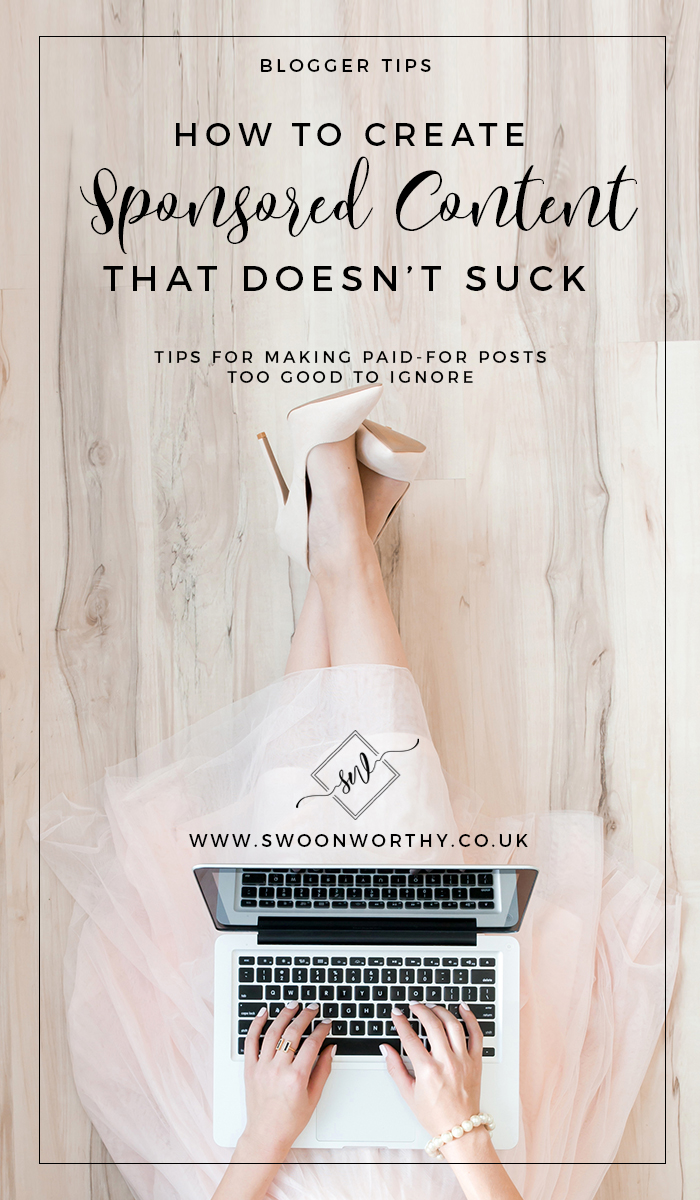It’s been a while since I’ve done a Blogger Tips post and while I’m well aware that many of those who read my blog are not bloggers, I do think sometimes my posts about blogging might be informative to you too. There’s a lot of misinformation, distrust and ignorance around blogging (or ‘influencers’ – a word I’m not that keen on but whatever) and probably for good reason. So what I want to do is bridge that gap a little. Help those of you who are bloggers to reach those who are not and create a little more understanding around this whole industry where many of us are just trying to figure out what we are doing as we go along.
The thing is sponsored content can be pretty divisive.
As bloggers, in order to grow and expand, we want our hard work to be reflected back to us, to earn enough to make all the time and energy we pour into our blogs worthwhile. There’s little argument that blogs are actually hard work, despite what people may say, and if we do this as a full-time endeavour, we need to support ourselves and we need to make money from this blogging lark.
As readers, we don’t want to feel like we are being sold to. We don’t want to question if a blogger is only telling us about the ‘amazing’ XYZ brand because someone is lining their pockets to do so and once the post is published, XYZ brand’s product goes into the bin or dropped off at the charity shop, never to be seen or used again. Why should a reader trust a blogger that’s being paid for their opinion, after all? What value is there in that?
And yet, there is value. When a blogger has worked hard to create an audience that trusts them, that continues to read their words every day, that clicks on the products they recommend and love, that then purchase those same products because someone else – someone they trust – told them they won’t regret it, a sort of magic happens. Brands can use influencers to reach more people and influencers, in turn, help out their readers, introducing them to products or services or brands they’re not familiar with. It could open their minds to new opportunities, to new experiences, to new products. For many smaller businesses that simply do not have a huge marketing budget, bloggers – with their large audiences – can help them reach far more eyes than they might be able to do with more traditional marketing approaches.
But how do you create sponsored content that your readers will love and trust? It’s clear that many sponsored posts just simply do not perform as well as non-sponsored content. Many readers no longer trust it, assume it’s an ad and skip it, just like they would fast forward an advert for a programme recorded on their Sky box or skip over in a magazine. You may be tempted as a blogger not to bother disclosing when it is sponsored content, thinking readers won’t notice a jarring ad right smack in the middle of your post. But I’m here to assure you that there are ways to create sponsored content that your readers will find helpful and that they’ll enjoy even when they are fully aware the post is sponsored. And you’ll create content that you’re proud to have on your blog and collaborations that you feel good about. There’s a balance and it’s actually easier than you think to maintain.
So today, I’m going to share some tips for creating sponsored content that doesn’t suck. Now, I’m not saying I always hit the mark here myself but I’ve had quite a lot of readers, as well as fellow bloggers, say that I’ve managed to strike that balance well over the years. In fact, my second most popular post of 2017 (clocking up close to 50k views and still climbing) was, in fact, a sponsored post. The year before that, one of my most popular posts was, yep, another sponsored post. So I thought I’d pass along a few tips to creating sponsored content that your readers won’t hate.
Have You Disclosed?
The first step? Always disclose to your readers that you have a vested interest in whatever product you are marketing to them. There are two incredibly important reasons for this. First, because you owe it to your readers to be honest with them. They are the reason you are making money off your blog, remember? If you have are being paid to talk about a product or received the product for free, then tell them that. Their trust in you is why they read your blog. If you don’t want to destroy that trust (you don’t), then you’ve gotta be upfront. I’ll get to how to do this in a second. The second reason is that it’s actually illegal not to do so. CAP is the regulatory body of the ASA (Advertising Standards Agency here in the UK) that governs advertising online and they have very strict rules on disclosure. Read them, make yourself familiar with them. Ignorance is not an excuse.
If you are reading from another country, then get to know the disclosure and advertising laws for your jurisdiction. They will vary country to country but the general gist is normally the same – if you are advertising to your readers, they need to know.
How do you do this? There are a few ways and it will depend on the rules and regulations of your governing body and it varies depending on the type of post that it is. Here in the UK, it’s important readers know you have a vested interest right at the start of the post. In the US, they are required to put it right at the top of their blog post. Here in the UK, you can do that too but for me, I like to work it into the introduction. Why am I working with this brand? What do I like about them? Did they contact me or did I contact them? Have I used their products in the past? What was it about the products or service that appealed to me? Why did I want to share it with my readers? If you answer these questions within your post, your readers will not just understand that there’s a collaboration happening here but also WHY there’s a collaboration. It builds trust and still acknowledges that vested interest. At the bottom of my posts, I always make it very clear again in a disclaimer.
Does it Fit Your Blog?
Something that makes me want to crawl out of my skin is reading a blog post where the brand or product has simply been shoehorned in. Let’s say, for the sake of argument, it’s about creating Hygge in the home. So they are talking about lighting a fire and putting an extra knitted throw on the sofa and then suddenly they launch into a diatribe about weather seals for the windows. It’s like, (screeching brakes) ‘hang on… what did I just read?’ It’s jarring, it doesn’t fit. “Why the heck are they mentioning weather sealing?” And then it dawns on you. The blog post is sponsored by John Doe Weathersealing Ltd. and the blogger has shoe-horned their product into the post for a quick buck. Ugh. It leaves a bad taste, ya know?
On the other hand, if I’m reading a blog post about creating hygge in the home and the blogger is talking about lighting a fire and putting an extra throw on the sofa and you see the throw and it’s stunning because it’s been hand-knitted and oh there’s a mug with a little knitted cover on it too! and the blogger has photographed the products beautifully and you think, ‘Oh my god those are amazing, I need some of that knitted goodness in my life’ and they tell you about the business making these products and the woman behind it and how she left her career in finance to follow her dreams…. suddenly, you don’t really give a crap that the post is sponsored, do you?
And the difference is in the fit. In the first instance, if a blogger has never mentioned weather sealing in the past and it’s not a DIY or construction blog the content is going to jar. In the second, it’s a perfect match. When approaching brands about sponsored content or when a brand approaches you, you have to consider whether it’s actually a good fit for your blog. Is it something readers have asked you about in the past? Is it a subject matter close to your heart? Does it fit seamlessly into your personal style? Is it a product you would have talked about whether you are being paid or not? If it’s not, then you need to question whether it’s really the right collaboration for your blog or your audience.
Another way to look at it is to ask yourself, ‘Would I tell my sibling/mum/best friend about this product?’ If the answer is yes, then by all means, go for it. If the answer is, ‘probably not’, then perhaps it’s not the right thing to be talking to your readers about. If you love a product, then writing a post becomes easy. Your words will flow and the ideas will come quickly. Your readers will know immediately that you are passionate about it because it comes through. If you are struggling to think how you will frame something that’s a lousy fit, your readers will think exactly the same thing when they are reading it. Your readers are turned off, the brand doesn’t get the results they want and everyone loses.
Don’t Sell, Tell (A Story)
One way to make sure your sponsored content is something your readers will enjoy is to make it personal. So many times, blogs become favourites simply because we feel like we know the person behind the screen. We feel a connection to them, whether that’s simply admiration of their talents, the way they write, their relatability, their wisdom or experience or the way they allow us to dream. Use your personality and your own stories to weave the product or service you want to talk about within those stories. Does the product mean something to you that readers may not know? Has it changed your life in some way? Does it remind you of something in your past? Is it something you’ve loved since you were a teenager? Don’t sell the product to your readers or simply regurgitate a press release – the beauty of a blog is that it’s personal and using whatever it is that makes you, well YOU, should be a part of that. So don’t sell – tell a story instead.
Talk about the people behind the business
I think this works especially well with smaller businesses but I think when we get to know the people behind the brand name, it becomes so much more personal to our readers. I am always interested to see how businesses got their start and with more and more of us becoming (or wanting to become) entrepreneurs and so many out there starting our own businesses, I find it fascinating to hear how people have made a success out of a passion. Further to that, dig a little deeper: does the business help the local community? Are they ecologically minded? Do they support fair trade? Are their products organic? If these are qualities that are important to you and things you’ve spoken of in the past with your readers, then share that information with them. You can even go above and beyond and tap into the business minds behind the brand – consider conducting an interview, have them share their own expert tips, take advantage of the relationship you have with them to give your readers a more informed and interesting post.
Empower Your Readers
Finally, if you don’t have a particular story to tell, can you teach your readers something new? Can you give them tools to overcome an obstacle or show them an easy way to do something? Can you save them money or create something unique to pass along to them? It’s another way to make sponsored content come to life for your readers by giving something back to them. Your content should really always do this (it’s good for SEO which you can read about here) but if you are able to empower your readers with new knowledge or understanding, you’ll go a long way in making your sponsored content fit seamlessly into your non-sponsored content.
I could probably share a few more ideas on making sponsored content something your readers will actually enjoy reading but this post is pretty long so I think I’m going to leave it here! If you are a blogger, what ways have you ensured your sponsored content stood out? Have you had a successful collaboration your readers responded to and why? If you are a blog reader, then what turns you off about sponsored content and what can we as bloggers do to make it right? I’d love to hear from you!






















I’m not a blogger but an avid reader and I can absolutely see why the velvet sofa post is so successful. First of all, you don’t need to convince me that you love velvet sofas – you have two! Second, the post is offering advice to the reader that goes way beyond trying to flog upholstery. It feels like a post you could have written whether sponsored or not. And I love the writing!
Really thoughtful, intelligent post – thank you.
Thanks so much Caroline – that means a lot to me! You are right though – I adore velvet and have it EVERYWHERE! Ha! Easy to write about something you love ;) xx
It’s interesting that some of your sponsored posts have become the most popular. It’s the same for me. Maybe we actually put far more effort into them to make them relevant and interesting. That’s a good thing for sure. And it can only happen if we genuinely love the product. Or trend. Or whatever. I’m sure our readers pick up on that. Fab post. x
That’s so true and such a good point Carole! I think when you are working with a brand, you put that bit extra effort into your posts because you want to make sure they are happy but it’s a win-win all around! xx
You’re on the mark, Kimberly. But I can add that as a PR pro for (gag) 37 years, basically all my adult life, I have worked with many editors and writers on trips and experiences sponsored by my tourism clients. In the U.S. there is no law about disclosing the sponsorship. The media know me and expect a level of excellence to report to their readers. However, I do not expect a rave review (though it’s nice) and appreciate honesty if things are called out as so-so in an article. That’s the risk we as sponsors run. Sometimes it’s edifying, instructive. When things have gone seriously wrong, some of my media friends have graciously offered to not write a story. So as a blogger, if you don’t favor the product, you can decline it and stay mum. At the end of the day, it’s about trust. Trust between you and the sponsor’s marketing team and the sponsor’s knowledge and strategic “targeting” of you to ensure a good match for a product. Trust between you and your readers. And as the bridge between the sponsor and reader, you must know that what resonates with you will also touch the readers you know so well. Your tips for bloggers about digging deep into the sponsors and their products are wonderful and exemplify the esteem in which I hold good journalists (which you are). Case in point: Your story about your IKEA trip. But I wonder. Have you ever declined a product and not written about it, but offered honest feedback to the would-be sponsor? Have you accepted a product and dissed it on your blog? Have you reported bad experiences and named names? I gather not, although sometimes it can be called for and your honesty and transparency would also be appreciated by your readers. The pen can be a weapon for a successful blogger like you, although I know you would never use it that way. One more story then I’ll stop. In the golden era of travel PR virtually all journalists accepted sponsored trips/experiences. Then Conde Nast Traveler, under Harry Evans and Tina Brown, came out with the subtitle “Truth in Travel” and a policy that banned press junkets. The policy, which was widely adopted by papers of record throughout the U.S., killed off travel pages in media with no budget for travel. Gone were the first-class flights too (boo hoo). And it’s really never recovered. With its decline, the country lost first-rate travel journalists. So we need to appreciate that sponsorships are a lifeline for journalists who have a responsibility (if they’re good) to delve deeply into the culture and quality of the company. Otherwise, do you graciously decline?
Thanks so much for such a thoughtful and interesting comment, Beth! I believe it’s always been much the same here in the UK where journalists never had to disclose that they were on these trips for free (plus getting paid by the publication) and so it’s simply ignorance by the public that bloggers are somehow less trustworthy if they do the same. Very interesting about Conde Nast though – I didn’t know that!! As for your questions regarding what I do if I don’t like or have problems with a product. First, I’m incredibly choosy what I accept. I probably turn down 90% of the offers I receive because for the most part, I know what I like and what businesses I’d prefer to work with and I hate the idea of waste so there’s no point in filling up my home with things I don’t love. And thankfully, problems have been really rare. I did have an instance a couple of years ago where a brand sent me a chair and it came in filthy. I talked to them first, they went to great lengths to find out what happened and rectify the issue but I told them I would still let me readers know as I wanted to be honest with them and I did – but also said what they did to make things right. So I’m not adverse to talking about when things go wrong and I have an obligation to do that for my readers. Thankfully it doesn’t happen often! xxx
I find it really makes a difference when the client is open to how your interpret the brief. All too often I’ve felt constricted by deadlines or narrow guidelines. I’m so fussy about who I work with!
That’s so true! I tend to reject offers where I feel too hemmed in by their brief – I like to have more flexibility to create content I feel good about. Nothing wrong with being fussy – it’s what makes your blog so great! xxx
Really refreshing how honest this post it hun. I think if your branding is aligned with the client then it’s just so much easier. Audiences are so used to advertising now, that it’s obvious when it’s not genuine x
Absolutely agree – a good fit makes all the difference! Audiences definitely know when something is inauthentic! xxx
I totay agree about making it personal! It has to relate to something I’m doing or working on in my home xx
Me too – I can’t just launch into bathroom taps if I’m not already thinking about bathroom taps! LOL! xx
I find it really quite hard to make sponsored content work. I’ve not been doing paid collaborations for very long so it’s still a bit of a learning curve for me. But I definitely feel like I’m getting much better at it. Your tips here are brilliant though. Your sponsored posts never feel like advertising. They are very authentic and that is a hard thing to achieve.
I thought your last post was great Stacey! Really informative, important message and great images ;) And thank you lovely, that really does mean a lot! It’s probably due to the fact that I reject so many offers that I only take on what feels totally right for me and perhaps that comes through xxx
So many good points here.
A great post, Kimberly.
It’s finding the right balance all the time isn’t it? I’m pretty picky about brands that I work with. Life’s too short for selling out!
Great post, Kimberly! It hasn’t been long since I started getting offers of sponsored posts and product reviews and yes we all gotta eat and pay bills, but I’ve turned down many already because they just don’t fit in with my style or values. I only accept those where I like the brand and where I know I can create content that’ll be useful, inspiring and relevant to readers. As a reader of interior blogs too, I’ve seen some of them totally sell out and promote anything and everything whether it’s related to interiors or not, and it’s a total turn off.
Weather seals!!!!!! :D
Really good post, Kimbo! And – as I’ve said before – your sponsored content is always so genuine and fitting to your blog and your style. You never sell out!
xx
As a blog reader I definitely don’t like the sponsored content that doesn’t fit in with the style and previous experience of the author. Not only does it jar and seem fake but it reduces my confidence in things that they may write about in the future. My favourite bloggers either write articles that are interesting regardless of whether they are sponsored or not or they are telling me about something new that I immediately want to buy/do myself! Can I ask what you do with things that are sent to you that you don’t like or feel you don’t want to write about – just being nosey!
Spot on Kimberley – fab post! I think people outside our field don’t see the number of offers for sponsored content that we generally reject because they don’t fit the bill. I only collaborate with brands if they fit the aesthetic/ethos of my blog and that I know my audience will want to hear about/are genuinely of interest to me and my lifestyle. Being able to write passionately and have an interest in the subject matter is paramount to a sponsored post being engaging, and to me actually wanting to spend time crafting and promoting the content!
Great post Kimberly and I found myself internally yelling “YESSSS!” many times at your points! There are so many important factors to accepting a sponsored post and it’s a lot harder than people realise to write a sponsored blog post that doesn’t scream THIS IS AN OBVIOUS AD. Only accepting posts that are true to what you write about makes things so much easier and something I try to keep to.
Love this!! And I agree with everything you said. I’m really careful about what sponsored content I post as I don’t want my blog to turn into an advertising site but it’s also hard to walk away from some opportunities especially If I love the brand or the product.. I was once approached about writing about workwear (as in factories!) I know I cover interiors but that’s a bit too much considering we don’t carry out any of the building works ourselves 😂 Xxx
You and Sarah Akwisombe do this really well, some others, erm not so.
It’s, ooh, what do they like? I’ll have a look.
Such an informative post! I hadn’t realised until you expressly said that one of the reasons I think your sponsored posts come accross so well is because you really talk about why you love the business and the people behind it. I find it off-putting when there’s a very formal ‘this a paid sponsorship’ line at the top of a post, and then the rest of it is written as though it isn’t sponsored content… It comes accross as though it’s being swept under the carpet! Rx
Great post!
I’ve been toying with this idea for a long time, but my blog is a small one. Granted, I have a lot more time to blog now than I have in the past 3 years, but I still shy away from actually doing this for money.
It is posts like this that make me a much more informed blogger.
Thank you!
This is great, I always love your blogger tips and find them so much help! It’s not like sponsored posts are a huge issue for me (unfortunately! lol) but when I have done them I’ve found it difficult. I turn down most offers I get because they really have nothing to do with my blog, and even when I have done them I’ve found it tough to make it natural, as you do. It’s so hard, and it’s something I want to get right, as I’ve stopped following so many blogs because it’s literally gotten to the point that nine posts out of ten were sponsored, and not in a natural way. I understand it’s hard to turn down the money (oh lord do I understand!!) but as a reader that’s pretty hard to swallow. I’ve actually found that a much more palatable way for me to make a little bit of money from my blog is with affiliate links, as I’m only sharing stuff I’m using and recommending anyway, and so I don’t feel weird about it (and of course I’m still disclosing).
A great post, Kimberly.
Audiences are so used to advertising now.
Your blogger tips are very much helpful!
Thank you!
This is great, I always love your blogger tips and find them so much help! It’s not like sponsored posts are a huge issue for me (unfortunately! lol) but when I have done them I’ve found it difficult. I turn down most offers I get because they really have nothing to do with my blog, and even when I have done them I’ve found it tough to make it natural, as you do